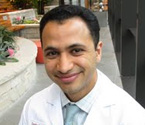
Saha Laboratory Opens Doors to Study Highly Lethal Cancer of the Bile Ducts
 Cholangiocarcinoma Foundation Sees Great Promise in New Research Lab
Cholangiocarcinoma Foundation Sees Great Promise in New Research Lab
[SALT LAKE CITY, Utah (November 9, 2016) With the opening of the Saha Laboratory for Liver Cancer Translational Research, a giant step forward has been made in the study of cholangiocarcinoma, a highly lethal malignancy of the liver bile ducts. Supryia Saha, MD PhD, has joined world-class scientists in Seattle at the Fred Hutch Cancer Research Center – the home of three Nobel laureates – to revolutionize prevention, detection and treatment for cholangiocarcinoma.
Liver cancer is one of the fastest growing cancers in the United States and world-wide both in incidence and mortality. Intrahepatic cholangiocarcinoma (ICC) is the second most common sub-type of liver cancer and has almost tripled in incidence in the last 40 years (Saha, et al. The Oncologist, 2016). Researchers in the Saha Lab will use a series of unique model systems including genetically engineered mouse models, patient-derived xenografts and cell lines to understand the fundamental pathogenic mechanisms of liver carcinogenesis and to identify new targeted therapies for specific genetic subsets of this disease.
The long-term goal is to transform the standard of care in cholangiocarcinoma from combination chemotherapy for all patients to ‘precision medicine’ with a specific targeted therapy regimen designed for each patient’s molecular profile.
As a medical oncology Fellow at Mass General Cancer Center, Dr. Saha’s work on cholangiocarcinoma has been recognized for publication in major scientific journals, including Nature, and by the National Institutes of Health (NIH), in the form of a Mentored Clinical Scientist Career Development Award. This Award will provide >$800,000 in support for cholangiocarcinoma research. He was also the recipient of a Conquer Cancer Foundation Young Investigator Award supported by the Cholangiocarcinoma Foundation (CCF).
According to Dr. Saha, “With the tremendous support of the Cholangiocarcinoma Foundation and outstanding mentorship from Drs. Nabeel Bardeesy and Andrew Zhu, our team at MGH was able to develop a state-of-the-art cholangiocarcinoma basic and translational research program. Beyond the Award, the Cholangiocarcinoma Foundation invited us every year to an outstanding conference, bringing together cholangiocarcinoma researchers, physicians and patients from around the world. There I was able to form lasting collaborations that have allowed me to explore novel targeted therapies in the disease and work together to generate a novel human cell line panel as a critical resource for the field. The Cholangiocarcinoma Foundation deserves enormous credit for shining a light on this devastating disease, which is just now beginning to get the attention it deserves and so clearly needs.”
Dr. Nabeel Bardeesy, Principal Investigator at the Bardeesy Lab at MGH also shared his perspective on this momentous development in the field of cholangiocarcinoma research; “I am very grateful to the Cholangiocarcinoma Foundation for supporting Dr. Supriya Saha through the Young Investigator Award. Dr. Saha has recently completed a highly successful postdoctoral fellowship in my laboratory at MGH where he made important advances in understanding the genetic underpinnings of cholangiocarcinoma and in establishing essential model systems for further studies of this cancer type. I am very pleased that he has chosen to maintain a strong focus on this understudied disease, and I am confident that his laboratory will make major contributions to elucidating its basic mechanisms and to improving its treatment. The Cholangiocarcinoma Foundation’s support and the research community that it has fostered were central to Dr. Saha’s development as an outstanding physician-scientist.”
To learn more visit: